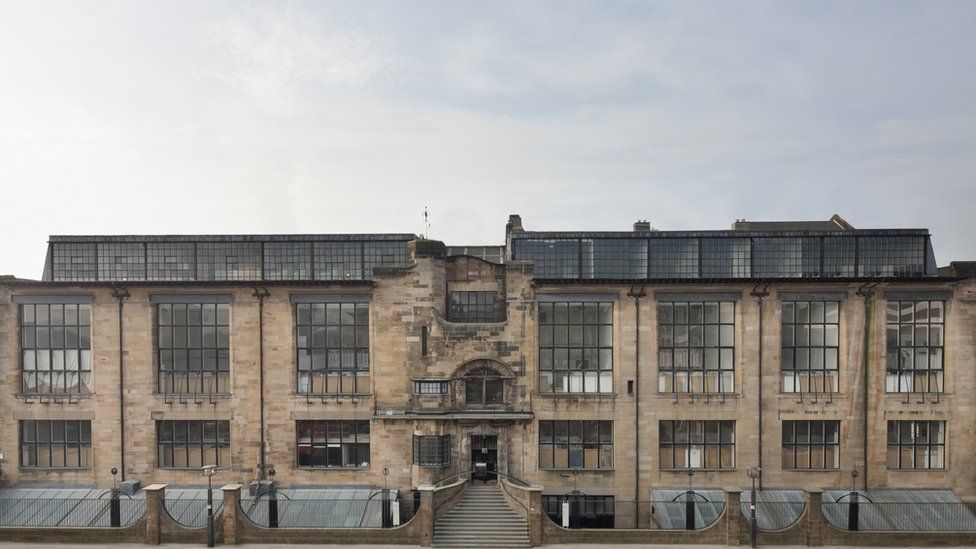How the world came to love Glasgow School of Art
- Published

When Mackintosh's Glasgow School of Art building was first unveiled in 1899, the half-finished building was deeply unpopular but Glasgow and the world grew to appreciate its architectural genius.
These days Charles Rennie Mackintosh's most famous architectural creation has come to be widely loved and cherished.
And there was a national and international outpouring of grief when it was first devastated by fire in 2014 and its magnificent library completely destroyed.
A massive restoration project was undertaken, with the library painstakingly recreated in very detail.
It would appear all that work has been destroyed and Mackintosh's masterpiece has again been consumed by fire.
It would have been hard to predict such affection for this building when it was first shown to the public on a rainy day in the last month of the 19th Century.
Over in the west of Glasgow, the new Kelvingrove Museum and Art Gallery, by London architects Simpson and Allen, was taking shape.
It was grand, frothy and pleasingly symmetrical.
In contrast, the new Glasgow School of Art, at the back of Sauchiehall Street in the city centre, was having a more troubled birth.
The art school's maverick director, Fra Newbery, had chosen 31-year-old Mackintosh as the architect, despite him not being a partner in his firm and having only designed a couple of previous buildings.
Newbery knew Mackintosh because he was a former pupil at the art school.
Mackintosh had been a member of a group of radical students who dubbed themselves The Immortals.
Along with his friend James Herbert MacNair and the sisters Margaret and Frances Macdonald, they created innovative and, at times, controversial graphics and decorative art designs which formed the distinctive "Glasgow Style".
Newbery wanted to bring some of this style into his new art school building but the original budget only covered half of the plans and it was opened half-finished.
It was deeply unpopular, seeming to lack symmetry or logic.
Mackintosh was not invited to the opening ceremony.
But slowly over the decades Glasgow and the world grew to love this strange building, with its great grid-like structure and its iron work around the windows.
Inside the building there were dark corridors and studios drenched in sunlight as well as intimate alcoves, with simple yet beautiful designs.
The building had personality.
By 1907, funds had been raised to complete the school of art building.
The existing east facade resembled one of Mackintosh's Barionial castles but his new west facade was very different, with a trio of slender oriel windows- more linear, geometric.
This did not look like a Scottish fortress but more like the palace of a Japanese Shogun.
Encased behind the windows was the new library.
A space in which Mackintosh's style took yet another leap forward.
Designed around a central courtyard like that of a Japanese residence, balconies and verandas encircled the room. There were beams that created a wooden grid floating in space.
It eventually came to be seen as the most perfect room designed by this visionary architect.
Glasgow remained unsure of Mackintosh during his lifetime and his career ground to a halt soon after the completion of the school of art.
Mackintosh, who was described as having a satanic personality and drank heavily, was thought to have had a nervous breakdown and left his architectural firm in 1910.
The outbreak of World War One meant he got very little work and he ended up eking out a living as an artist in London.
He spent some of his later years in the South of France and died in 1928 at the age of 60, having not worked on an architectural project for years.
2018 is the 150th anniversary of his birth and the city that once rejected him has been celebrating his legacy and architectural genius.
There are some other buildings in the city that bear the Mackintosh mark such as Scotland Street School and Queen Cross Church but the art school was his masterpiece and it has again been destroyed.